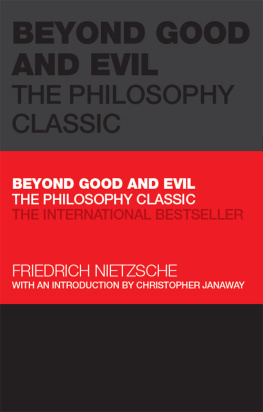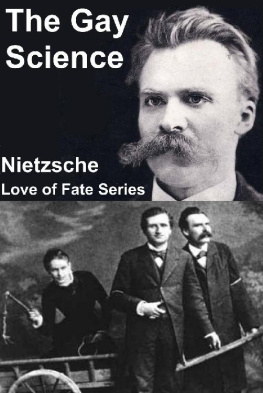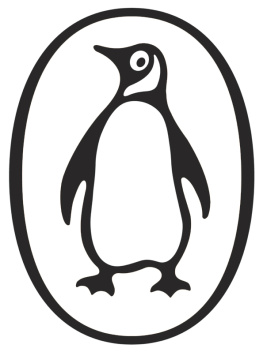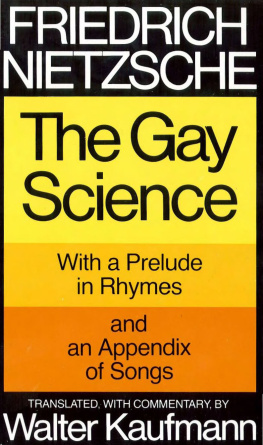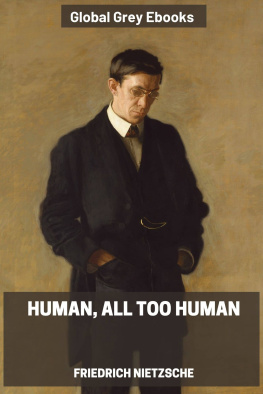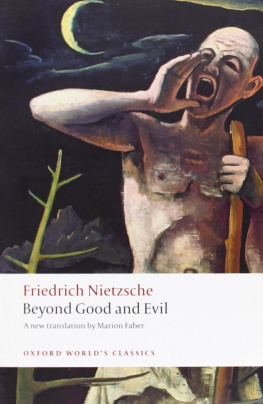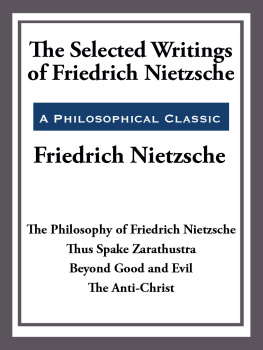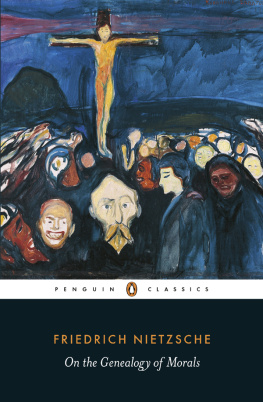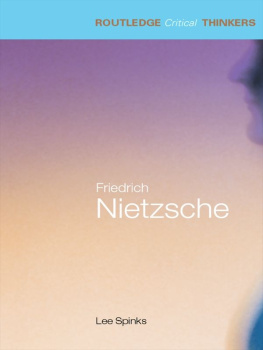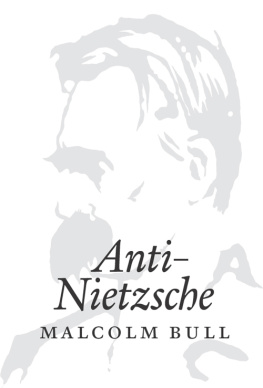Friedrich Nietzsche - Beyond Good and Evil
Here you can read online Friedrich Nietzsche - Beyond Good and Evil full text of the book (entire story) in english for free. Download pdf and epub, get meaning, cover and reviews about this ebook. year: 2019, genre: Religion. Description of the work, (preface) as well as reviews are available. Best literature library LitArk.com created for fans of good reading and offers a wide selection of genres:
Romance novel
Science fiction
Adventure
Detective
Science
History
Home and family
Prose
Art
Politics
Computer
Non-fiction
Religion
Business
Children
Humor
Choose a favorite category and find really read worthwhile books. Enjoy immersion in the world of imagination, feel the emotions of the characters or learn something new for yourself, make an fascinating discovery.
- Book:Beyond Good and Evil
- Author:
- Genre:
- Year:2019
- Rating:5 / 5
- Favourites:Add to favourites
- Your mark:
- 100
- 1
- 2
- 3
- 4
- 5
Beyond Good and Evil: summary, description and annotation
We offer to read an annotation, description, summary or preface (depends on what the author of the book "Beyond Good and Evil" wrote himself). If you haven't found the necessary information about the book — write in the comments, we will try to find it.
Beyond Good and Evil — read online for free the complete book (whole text) full work
Below is the text of the book, divided by pages. System saving the place of the last page read, allows you to conveniently read the book "Beyond Good and Evil" online for free, without having to search again every time where you left off. Put a bookmark, and you can go to the page where you finished reading at any time.
Font size:
Interval:
Bookmark:

Also available in the same series:
Meditations: The Philosophy Classic by Marcus Aurelius (ISBN: 978-0-857-08846-8)
On the Origin of Species: The Science Classic by Charles Darwin (ISBN: 978-0-857-08847-5)
Tao Te Ching: The Ancient Classic by Lao Tzu (ISBN: 978-0-857-08311-1)
The Art of War: The Ancient Classic by Sun Tzu (ISBN: 978-0-857-08009-7)
The Game of Life and How to Play It: The Self-Help Classic by Florence Scovel Shinn (ISBN: 978-0-857-08840-6)
The Interpretation of Dreams: The Psychology Classic by Sigmund Freud (ISBN: 978-0-857-08844-4)
The Prince: The Original Classic by Niccolo Machiavelli (ISBN: 978-0-857-08078-3)
The Prophet: The Spirituality Classic by Kahlil Gibran (ISBN: 978-0-857-08855-0)
The Republic: The Influential Classic by Plato (ISBN: 978-0-857-08313-5)
The Science of Getting Rich: The Original Classic by Wallace Wattles (ISBN: 978-0-857-08008-0)
The Wealth of Nations: The Economics Classic by Adam Smith (ISBN: 978-0-857-08077-6)
Think and Grow Rich: The Original Classic by Napoleon Hill (ISBN: 978-1-906-46559-9)
FRIEDRICH NIETZSCHE
With an Introduction by
CHRISTOPHER JANAWAY

This edition first published 2020
Introduction copyright Christopher Janaway, 2020
The material for Beyond Good and Evil is based on the edition translated by Helen Zimmern, originally published in v. 12 of The Complete Works of Friedrich Nietzsche (1909-1913), Edinburgh & London: T.N. Foulis, 1909-1913 and now in the public domain. http://www.gutenberg.org/files/4363/4363-h/4363-h.htm This edition is not sponsored or endorsed by, or otherwise affiliated with Friedrich Nietzsche or heirs.
Registered office
John Wiley & Sons Ltd, The Atrium, Southern Gate, Chichester, West Sussex, PO19 8SQ, United Kingdom
For details of our global editorial offices, for customer services and for information about how to apply for permission to reuse the copyright material in this book please see our website at www.wiley.com.
The right of the author to be identified as the author of this work has been asserted in accordance with the Copyright, Designs and Patents Act 1988.
All rights reserved. No part of this publication may be reproduced, stored in a retrieval system, or transmitted, in any form or by any means, electronic, mechanical, photocopying, recording or otherwise, except as permitted by the UK Copyright, Designs and Patents Act 1988, without the prior permission of the publisher.
Wiley publishes in a variety of print and electronic formats and by print-on-demand. Some material included with standard print versions of this book may not be included in e-books or in print-on-demand. If this book refers to media such as a CD or DVD that is not included in the version you purchased, you may download this material at http://booksupport.wiley.com. For more information about Wiley products, visit www.wiley.com.
Designations used by companies to distinguish their products are often claimed as trademarks. All brand names and product names used in this book are trade names, service marks, trademarks or registered trademarks of their respective owners. The publisher is not associated with any product or vendor mentioned in this book.
Limit of Liability/Disclaimer of Warranty: While the publisher and author have used their best efforts in preparing this book, they make no representations or warranties with respect to the accuracy or completeness of the contents of this book and specifically disclaim any implied warranties of merchantability or fitness for a particular purpose. It is sold on the understanding that the publisher is not engaged in rendering professional services and neither the publisher nor the author shall be liable for damages arising herefrom. If professional advice or other expert assistance is required, the services of a competent professional should be sought.
A catalogue record for this book is available from the Library of Congress.
A catalogue record for this book is available from the British Library.
ISBN 9780857088482 (hardback) ISBN 9780857088543 (ebk)
ISBN 9780857088536 (ebk)
Cover design: Wiley
An Introduction
BY CHRISTOPHER JANAWAY
There is no such thing as moral phenomena, but only a moral interpretation of phenomena.
In Beyond Good and Evil we find Nietzsche at the height of his powers as a writer and as a thinker. It is regarded by many as his greatest, most concentrated work.
In some ways it is quite easy to read. Full of energy, the book has many short sections that appear more or less self-contained. It is not bogged down by long-winded arguments and qualifications, and so is not like much traditional philosophical writing.
Nietzsche excites, amuses, provokes, shocks, and questions. We the readers are not just addressed but engaged. The very first line of the book is Supposing truth is a woman what then? We as readers have to make up our own minds what to do with the truths he reveals. What do they mean for society and civilization, and for our own lives?
Nietzsche wrote that the book was in essence a critique of modernity, including modern science, modern art even modern politics along with indications of an opposite type who is as un-modern as possible, a noble, affirmative type.
He might have said a critique of modern values. For, as the books title already intimates, values are its primary concern. For Nietzsche, good and evil are the values that define the morality of modern Europe, and of the Christian religion out of which it has grown. He puts both Christianity and morality itself in the judgement dock.
Though he famously dismisses Christianity as a slave morality, his bigger questions are: What are values as such? How do we come by them? How do they show up in our behaviour, in our science, our art, and in the way we do philosophy itself? Which values might we get beyond and no longer believe in, and what might we replace them with?
Such questions have been asked by many philosophers, but Nietzsche takes things a lot further: Is suffering really bad? Is compassion really good? Is self-denial a form of seeking power? Is seeking power bad? Is truth good? Are truths always a kind of error?
Although Nietzsche pursues these themes in all his subsequent works, its in Beyond Good and Evil that they get his deepest and most penetrating attention.
The book is also about human possibility and potential. When we go beyond morality and modernity, where does that leave the individual? Well find out why Nietzsches philosophy of the will to power might fuel success, yet also be dangerous if in the wrong hands.
Nietzsche published Beyond Good and Evil, subtitled Prelude to a Philosophy of the Future, in 1886, during the most productive decade of his life.
Between 1879 and 1889 he wrote many startlingly original books that display a mix of explosive pronouncement and incisive critique. Before 1879 he was Professor of Classical Philology (the study of ancient texts and languages) at the University of Basel in Switzerland. He was known principally for producing an unorthodox piece of classical scholarship,
Next pageFont size:
Interval:
Bookmark:
Similar books «Beyond Good and Evil»
Look at similar books to Beyond Good and Evil. We have selected literature similar in name and meaning in the hope of providing readers with more options to find new, interesting, not yet read works.
Discussion, reviews of the book Beyond Good and Evil and just readers' own opinions. Leave your comments, write what you think about the work, its meaning or the main characters. Specify what exactly you liked and what you didn't like, and why you think so.

